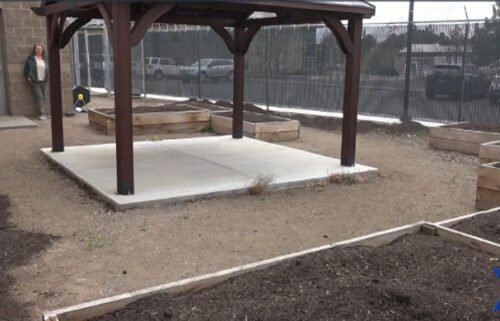DEQ extends Deschutes County air quality advisory through weekend: What does weeks of smoky air do to our health?
(Update: Adding video, comments from DEQ, Mosaic Community Health)
'The fire season is starting earlier, it's worse and it's also lasting longer'
BEND, Ore. (KTVZ) -- Despite some improvement in the High Desert's smoky skies, the Oregon Department of Environmental Quality and Lane Regional Air Protection Agency issued an updated air quality advisory Thursday for Deschutes, Jackson, Josephine, eastern Lane, eastern Douglas, Klamath, and northern Lake counties that's in effect through 4 p.m. Sunday.
Intermittent smoke could also bring poor air quality and haze to southeast Linn County and Eugene through Friday, officials said.
Greg Svelund, a spokesperson with the DEQ, told us Friday, "We had a decade where we didn't have any unhealthy for sensitive group air. We didn't exceed that orange (moderate air) standard."
According to the DEQ, in the last decade, there's been 61 days in Bend where air quality was considered unhealthy for sensitive groups, all the way up to the hazardous levels.
In the previous 10 years, from 2002 to 2012, there were only four days of unhealthy air quality in Bend.
"Taking a broader look, the season is extended further than it was in the past," Svelund said. "We are now seeing fires into early October. So the fire season is starting earlier, it's worse and it's also lasting longer."
So far in 2023, Bend has seen 10 days with air quality considered unhealthy for sensitive groups.
The region has averaged 12 days annually with those readings over the last six years.
"When you start thinking about what didn't make a chart like this, or in these numbers, you're actually talking about more than a month of your summer is being impacted by poor air," Svelund explained.
Mark Press, a family practitioner at Mosaic Community Health, said, "We've seen quite a lot of patients come in related to the smoke, particularly folks with underlying lung diseases, namely asthma and COPD."
At Mosaic, Press has seen an influx of patients with symptoms related to the smoke beyond those with lung issues.
"The smoky air is also really hazardous for people with underlying heart conditions," he said, "and so we are monitoring and giving a lot of caution to those with congestive heart failure, and other cardiac conditions as well."
On Friday, the air quality for much of the High Desert noticeably shifted from unhealthy for sensitive groups to moderate, allowing people to recreate throughout Bend during a welcome break from the heavy smoke.
"Take a day like today, and get your activities in," Press urged. "And on those days with the poor air quality, it's time to stay indoors. It's a time to hold off on exercise, and take it easy."
The American Lung Association warns that breathing unhealthy air can cause lung tissue to swell and also contribute to heart disease. They recommend keeping outdoor exercise to under 30 minutes, drinking lots of water and changing air filters in your car and home.
The E::Space air quality map of Central Oregon as of Thursday afternoon on the KTVZ.COM Weather page showed most of Central Oregon in the "Moderate" category (51-100 AQI), though monitors in Tumalo and La Pine registered at the "Unhealthy for Sensitive Groups" level (101-150). A day later, most areas were in the "Moderate" and even "Good" category, though conditions were expected to take a downturn.
Smoke levels can change rapidly, depending on weather. Check current conditions on the Oregon Smoke Information Blog, DEQ’s Air Quality Index, or by downloading the free OregonAIR app on your smartphone.
Smoke can irritate the eyes and lungs and worsen some medical conditions. People most at risk include infants and young children, people with heart or lung disease, older adults and pregnant people.
Protect yourself and your family when smoke levels are high:
- Stay inside if possible. Keep windows and doors closed. If it’s too hot, run air conditioning on recirculate or consider moving to a cooler location.
- Avoid strenuous outdoor activity.
- Use high-efficiency particulate air (HEPA) filters in indoor ventilation systems or portable air purifiers. Or create your own air purifying filter by following these instructions.
- Be aware of smoke in your area and avoid places with the highest levels.
- When air quality improves to moderate or healthy (yellow or green on the Air Quality Index), open windows and doors to air out homes and businesses, if temperatures allow.
- If you have a breathing plan for a medical condition, be sure to follow it and keep any needed medications refilled.
Cloth, dust and surgical masks don’t protect from the harmful particles in smoke. N95 or P100 respirators approved by NIOSH may offer protection, but they must be properly selected and worn. Select a NIOSH-approved respirator with a N, R or P alongside the number 95, 99 or 100. Learn how to put on and use a respirator. Respirators won’t work for children as they don’t come in children’s sizes. People with heart or lung conditions should consult their health care provider before wearing a respirator.
Additional resources:
- Find a cleaner air space in your area: Visit 211info.org and search for “Wildfire Related Clean Air Shelters.” Or call 211 any time or day.
- Learn more about protecting your health during wildfires.
- Updated smoke outlooks
- Local and Tribal contacts




